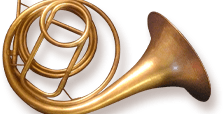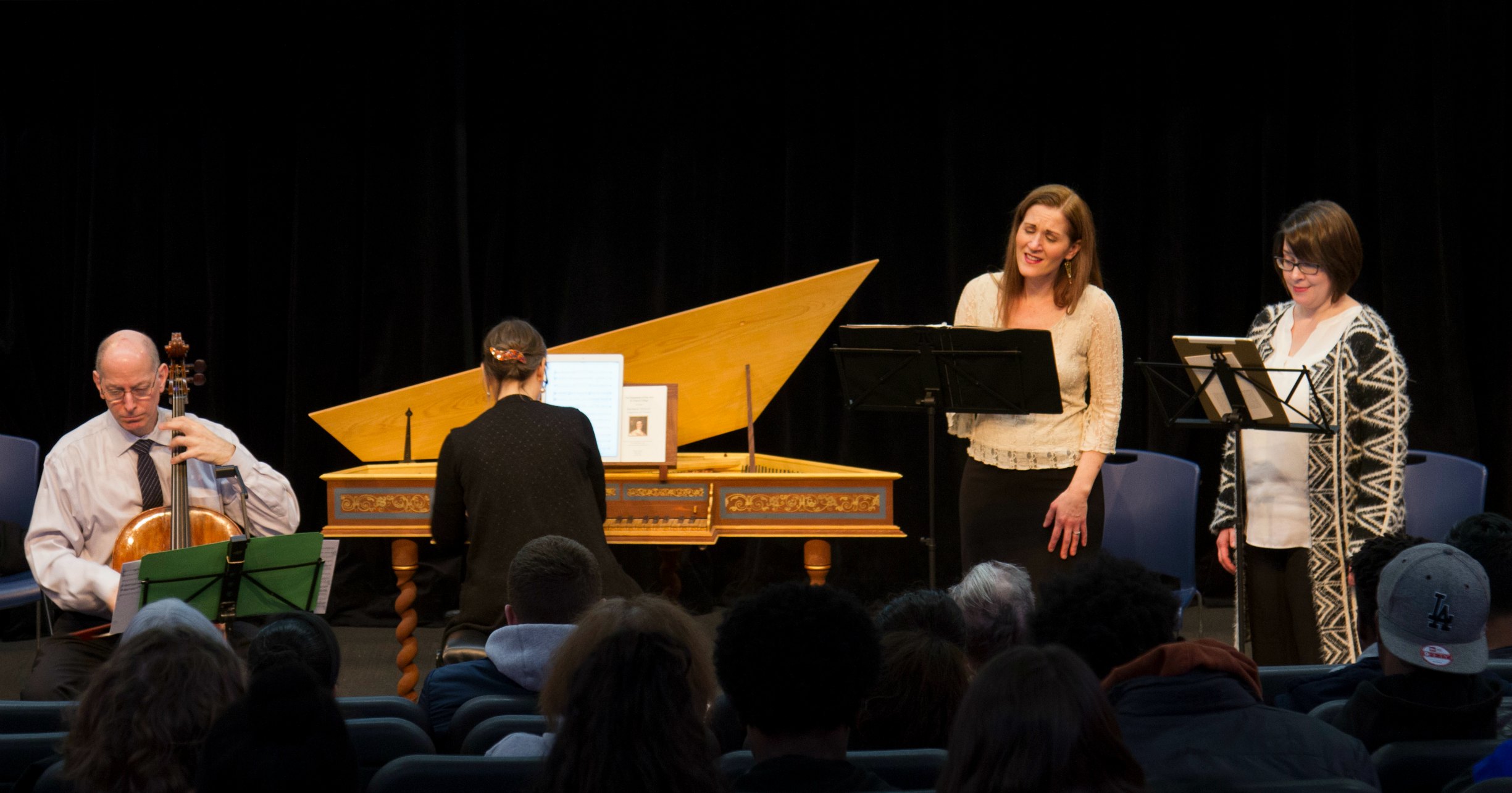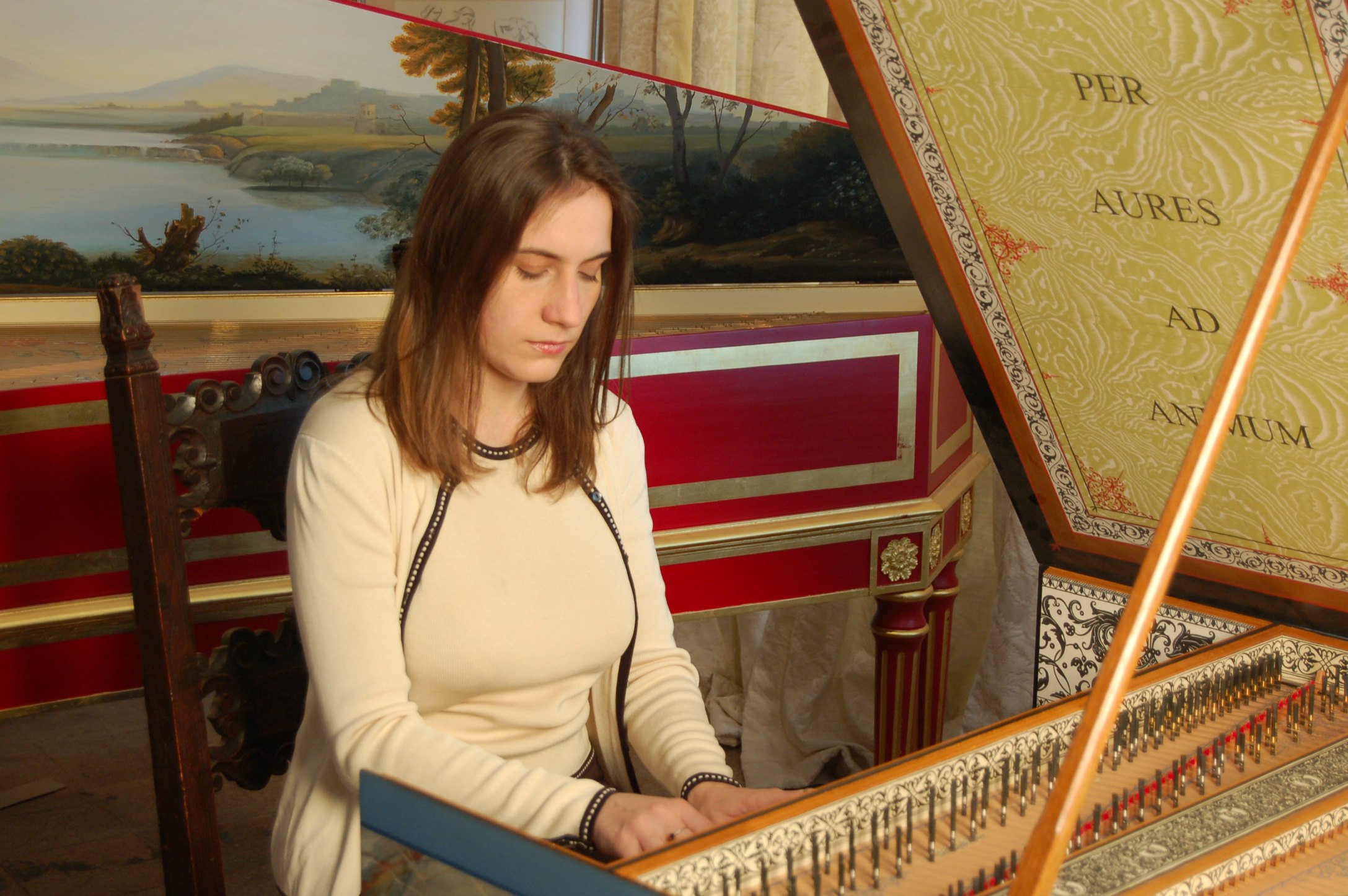Telemann in Paris
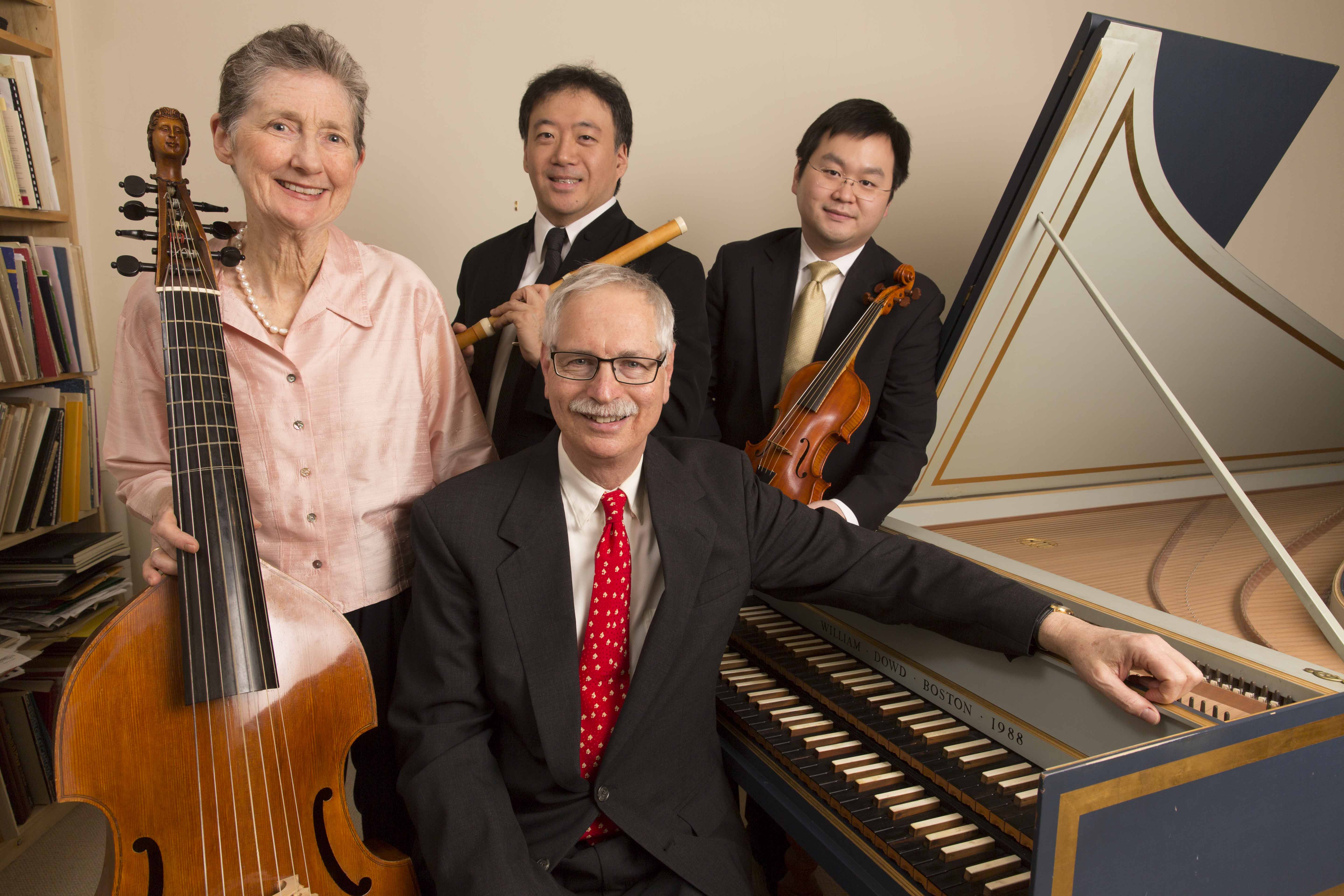
Among the most prolific composers of the first half of the 18th century, Georg Philipp Telemann contributed to the development of all pre-Classical styles in Germany, including operas, cantatas, masses, Passions, orchestral and chamber music. To commemorate the 250th anniversary of Telemann's death, the ensemble Gold and Glitter will perform two of his Paris Quartets.
From the canals of Venice and music salons in German courts to the bright candlelit halls of Versailles, the early music ensemble Gold and Glitter shines a new light on 17th- and 18th-century masterpieces of the Baroque era. Their aim, through great attention to detail and emphasizing historical performance practices, is to perform this music with flair, virtuosity, and passion in order to understand the composers’ intentions and make audiences love this music as much as they do. The four members of the ensemble, all with different backgrounds, studied in Europe and the US and now perform and teach all over the world. Their love and respect for this music brought them together in this great exploration of music from Bach’s time and before. www.danielslee.com
Sang Joon Park, Baroque flute
Daniel Lee, Baroque violin
Martha McGaughey, Viola da gamba
Arthur Haas, Harpsichord
Opera for Two
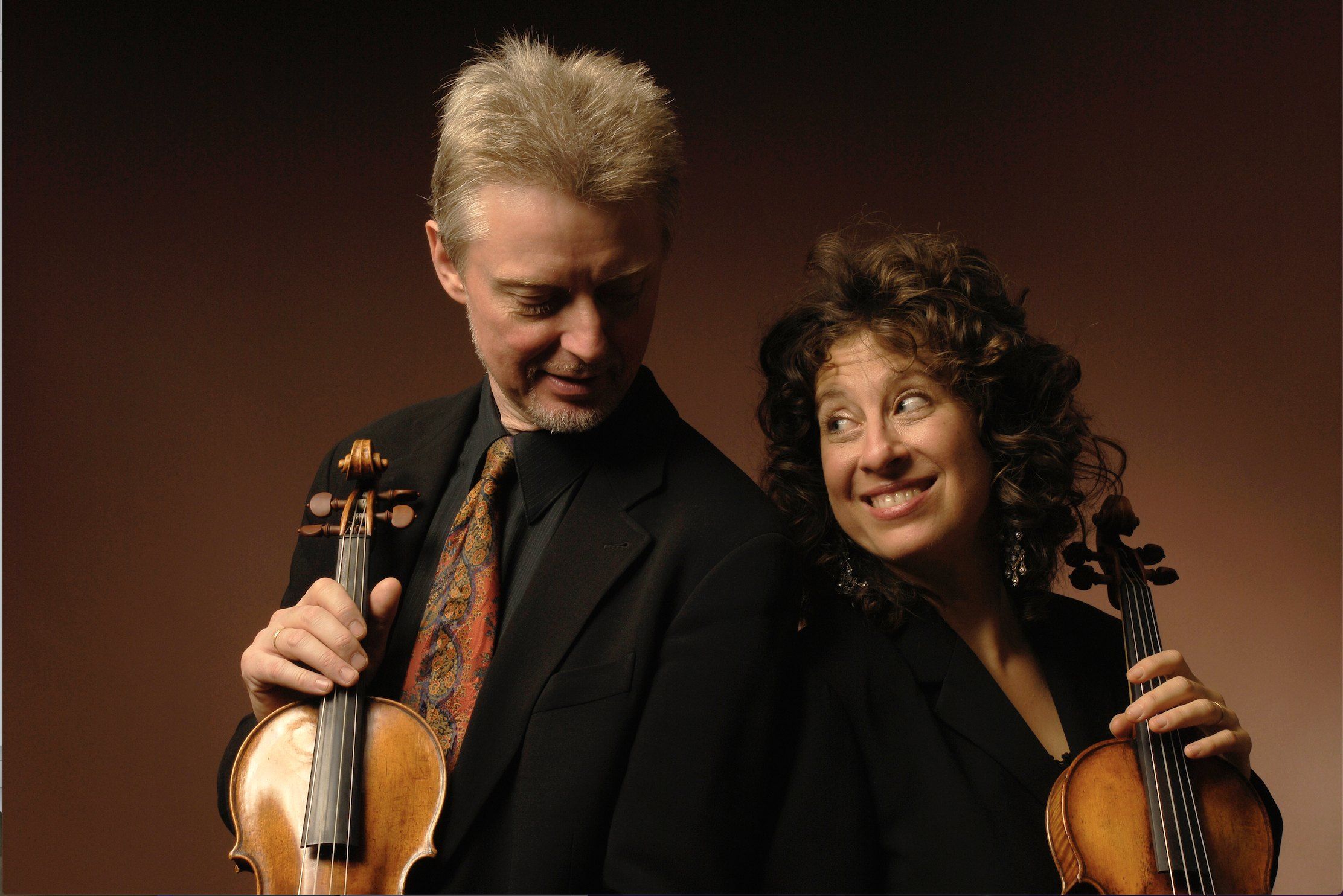
In the 18th century, opera was the pop music of the time, but without CDs and radio and the only way to hear it at home was to play it oneself. Black Marble present a program featuring colorful repertoire for two violins of an operatic sensibility, with a finale of transcriptions of arias from Mozart's famous 'Abduction from the Seraglio'.
The violinists of Black Marble are the co-directors of the internationally acclaimed baroque ensemble, REBEL. The name ‘Black Marble’ derives from the English translation of their last names: Schwarz (German, for black) and Marmer (Dutch, for marble). The duo has performed at the Metropolitan Museum of Art, Kendal-on- Hudson Concert Series, Harvard Business School Series, King Manor, Downtown Music at Grace and Midtown Concerts in New York City. in September 2010 Black Marble was featured on WQXR-FM’s ‘violin month’, in an interview and video performance hosted by Jeff Spurgeon. The ensemble aims to explore the rich, virtuosic and rarely performed repertoire written for two violins by Leclair, Telemann, Reger, Spohr and Bartok, amongst others, on instruments and bows appropriate to their respective periods. The husband and wife team perform on equally well-matched Stainer violins dated 1660 and 1668, respectively.
www.rebelbaroque.com/black_marble
Jörg-Michael Schwarz, violin
Karen Marie Marmer, violin
Evelyn's Diary
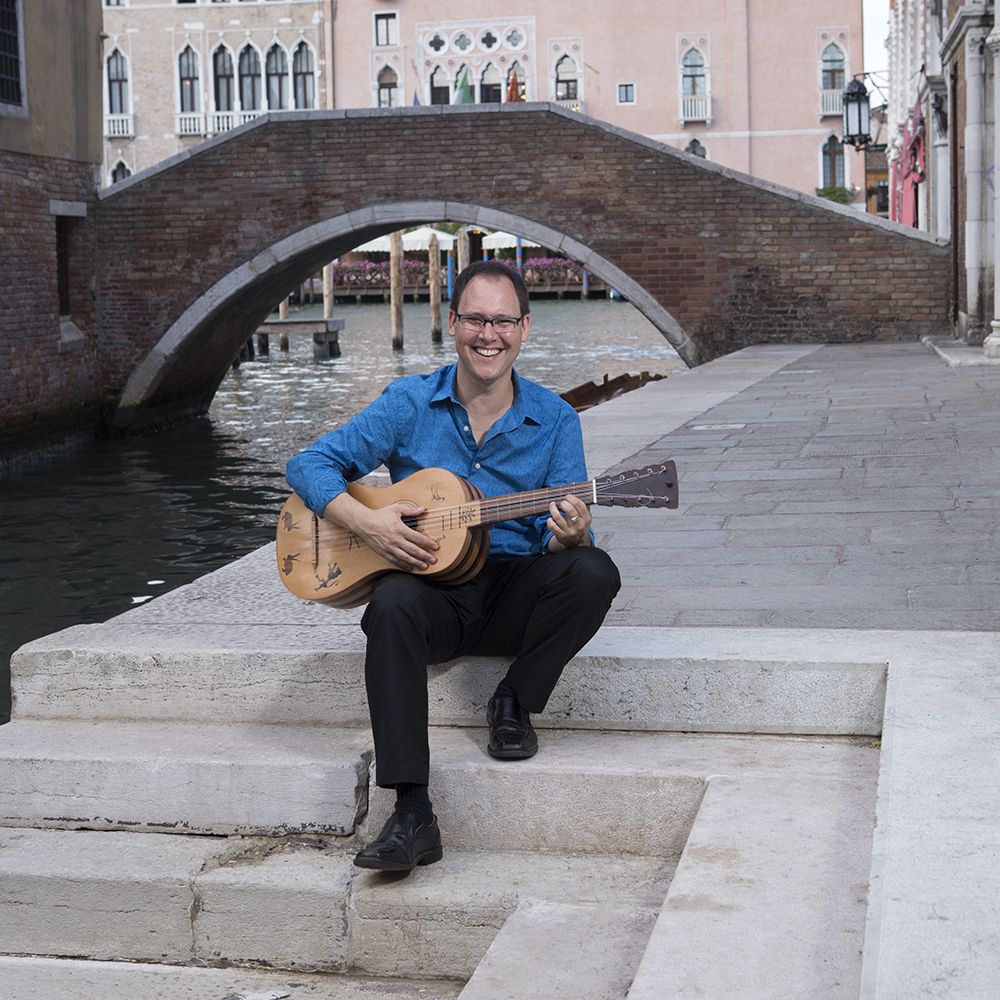
Accompanying himself on the Italian virginal and baroque guitar, Bud Roach performs a program of English and Italian music inspired by readings from John Evelyn’s diary. Solo cantatas from Stradella, as well as the famous castrato Pasquilini, and English music from Lawes, Purcell, and Lanier, performed by Canadian tenor Bud Roach, accompanying himself on the Italian virginal and baroque guitar.
Canadian tenor and baroque guitarist Bud Roach's recordings for the Musica Omnia label have been recognized internationally as ground-breaking achievements of historically-informed performance. Praised as "one of Toronto's most versatile musicians" (MusicalToronto.org), his innovative solo and ensemble programmes have been presented in the US, Canada, and Italy.
Bud Roach, tenor, Italian virginal, and Baroque guitar
Der getreue Music-Meister: Duos by Georg Philipp Telemann
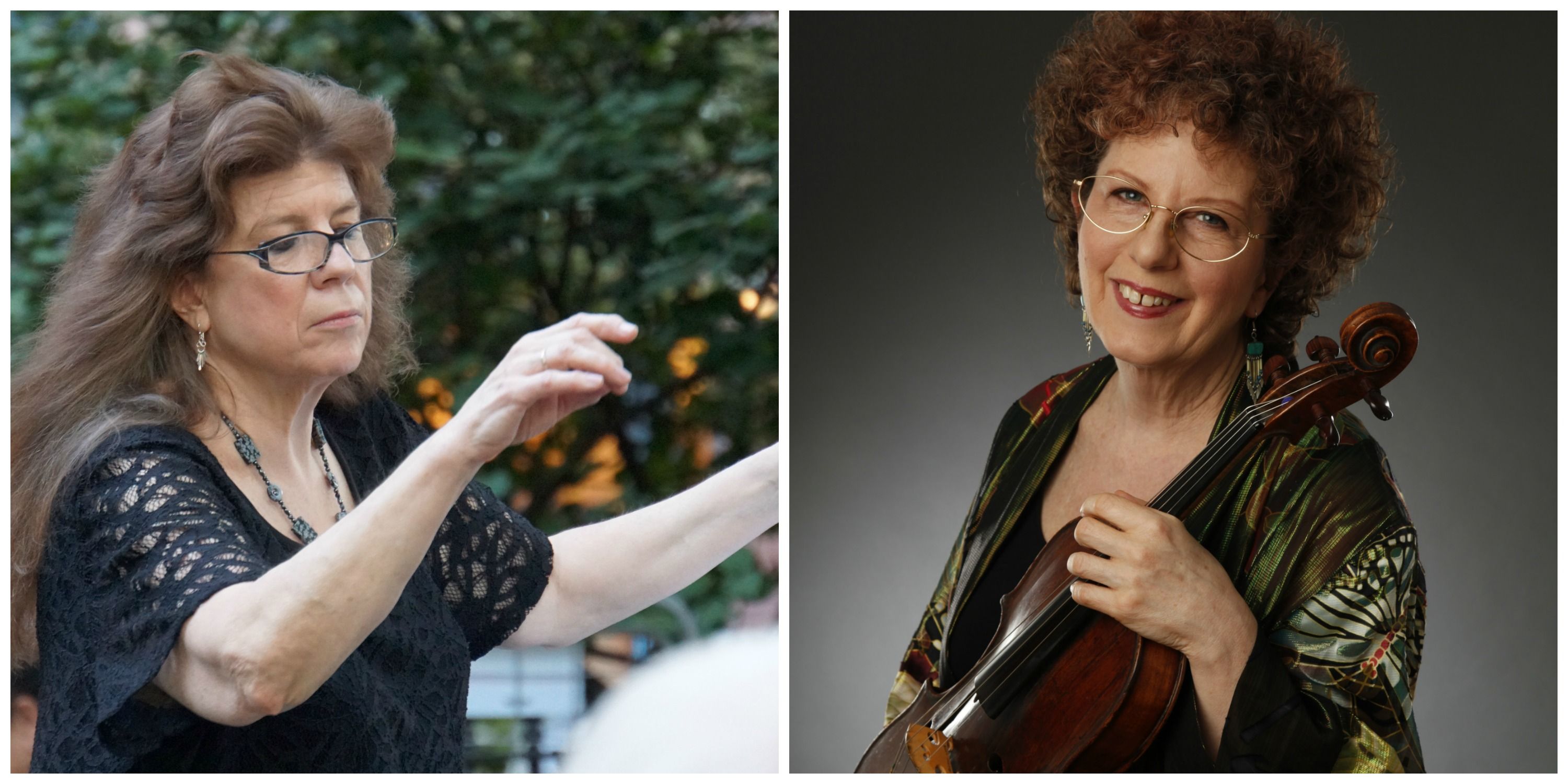
Georg Philipp Telemann is a true music master of the 18th century. His Opus 2 duets are well-known by both amateurs and professionals. This program offers some of Telemann's lesser known and later works from Der getreue Music-Meister (Germany's first music periodical) and also the 1752 print of bolder and more original duo pieces which survived in the Civico Museo Bibliografico Musicale in Bologna. These later "flute" duets have been seriously neglected, given the popularity of his well-loved Opus 2 pieces. We will also perform one of the Sonatas in Canon from Opus 5.
Deborah Booth and Louise Schulman are well-known NYC performers who have played together in several different ensembles: Ensemble BREVE, Orchestra of St. Luke's, Long Island Baroque Ensemble, Boston Early Music Festival, and others.
Ms. Booth is an active recorder and flute performer of historical and modern instruments. Performing credits include Handel Haydn Society, Amherst Early Music, Trinity Bach Vespers (NYC), Dorian Baroque Orchestra, and Big Apple Baroque. www.flute-recorder-deborahbooth.com
Ms. Schulman is recognized as a founding member and co-principal viola of Orchestra of St. Luke's, as well as her work on various historical stringed instruments. She has performed and recorded with the Folger Consort, Waverly Consort, Philomel, Ensemble BREVE, Long Island Baroque, Clarion and others.
Deborah Booth, recorders and traverso
Louise Schulman, viola
Barbara Strozzi and Her World
Barbara Strozzi was a remarkable and prolific composer in 17th Century Venice, whose songs are poetically and harmonically daring. The program will include the hypnotic "L'amante segreto" and the powerful "Lagrime mie", as well as duets, a cello sonata by her Bolognese contemporary Domenico Gabrielli, and a harpsichord piece by the Venetian keyboardist and lutenist Giovanni Picchi.
Brooklyn Baroque debuted in the fall of 2000, when cellist David Bakamjian joined the long-standing duo of Baroque flutist Andrew Bolotowsky and harpsichordist Rebecca Pechefsky. The trio performed frequently in the New York area and was invited to perform in other states across the country. Today core members Pechefsky and Bakamjian collaborate with the finest early-music specialists in the New York area. For this concert they will be joined by two of New York City's most distinguished sopranos: Marguerite Krull and Linda Lee Jones. www.brooklynbaroque.com
Marguerite Krull, soprano
Linda Lee Jones, soprano
David Bakamjian, cello
Rebecca Pechefsky, harpsichord
"SAHEL" Medieval Meets Mandinka
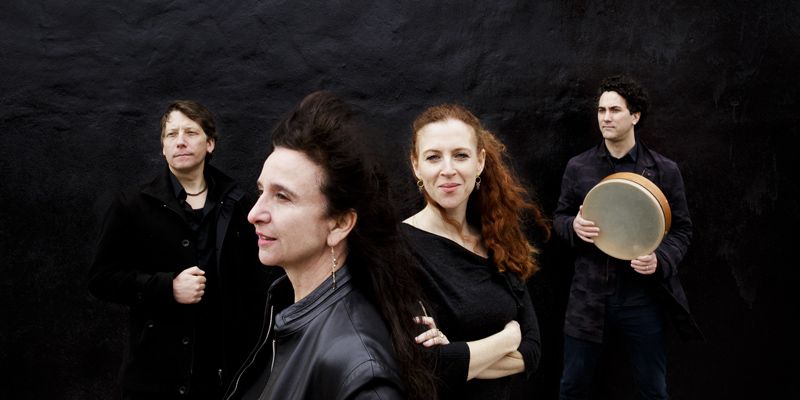
East of the River present a dazzling program of medieval estampies, monophonic songs, and traditional west African Mandinka kora music.
East of the River was founded by internationally renowned recorder players Nina Stern and Daphna Mor. The project explores gems of the European classical repertory together with haunting and virtuosic melodies of traditions to the East, arranged and interpreted by musicians whose backgrounds include classical, jazz and world music. www.eastoftherivermusic.com
Nina Stern and Daphna Mor, winds
Kane Mathis, kora
John Hadfield, percussion
Classical German Lieder with Foretepiano
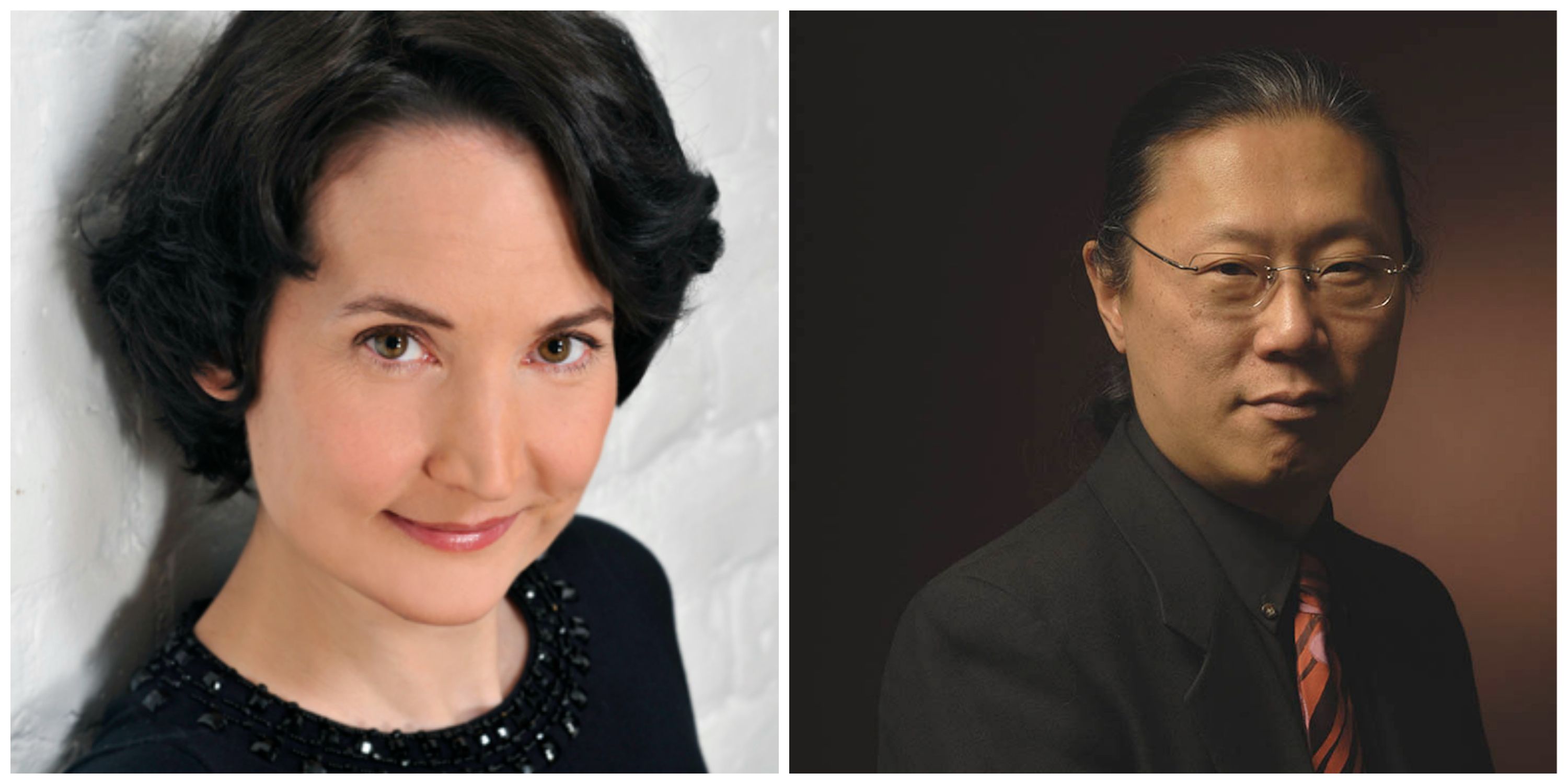
This concert offers audiences a rare chance to hear Classical Lieder by Haydn, Mozart, and Schubert accompanied by a copy of Mozart's own Anton Walter fortepiano now in Salzburg, made in 1981 by Philip Belt.
Soprano Amy Bartram is a soloist; recitalist; and has appeared with Vox, NY Consort of Viols, the Play of Daniel (GEMS), and more. www.amybartram.com
A specialist on early keyboard instruments, Dongsok Shin is in great demand as a soloist and continuo player. He is also a member of REBEL: www.rebelbaroque.com
Amy Bartram, soprano
Dongsok Shin, fortepiano
Follies Festivals
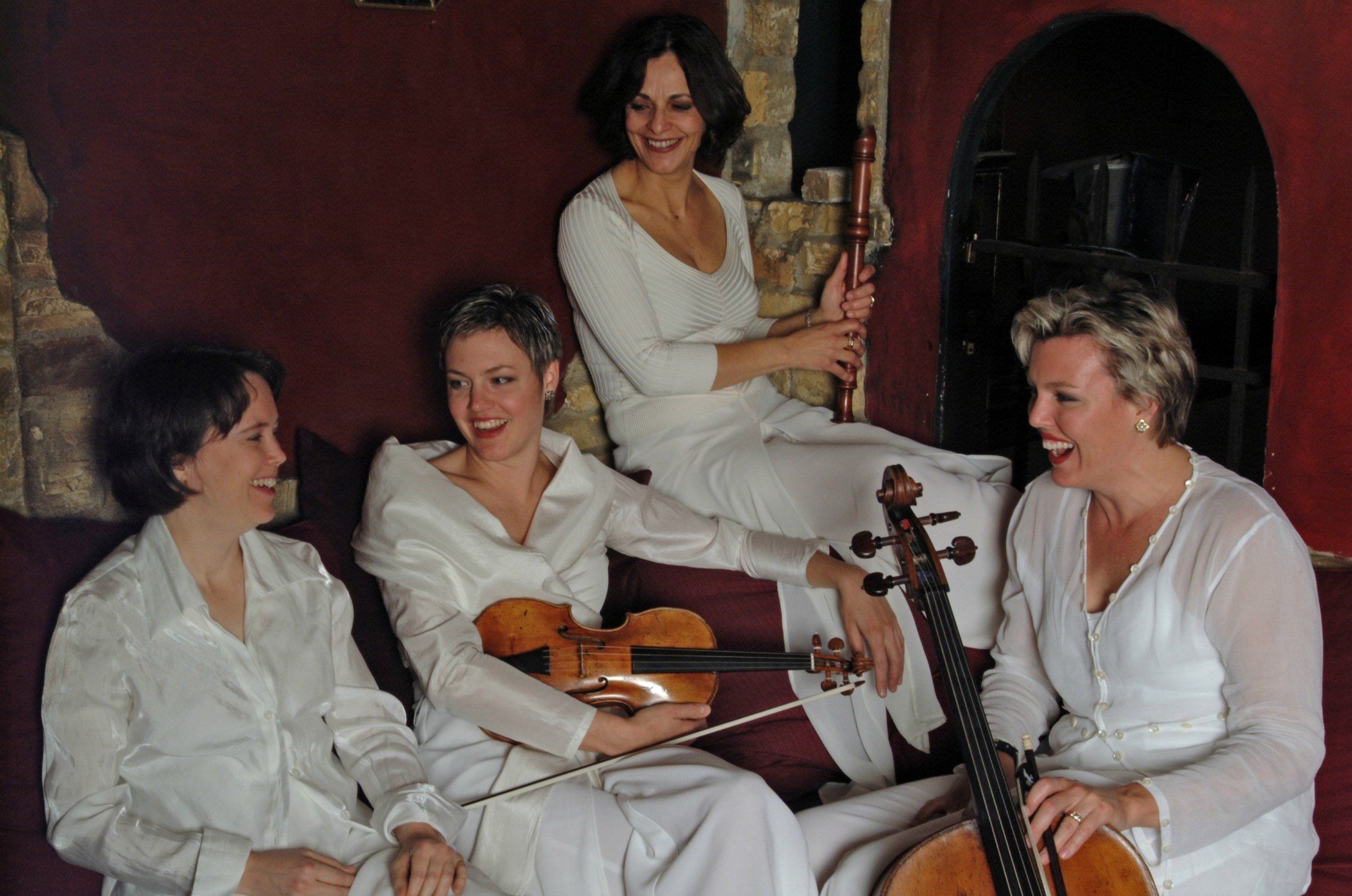
This program centers around one of the earliest written forms of instrumental dance music - the folia. From the boisterous street festivals of fifteenth-century Portugal to the refined entertainments of royal European courts, folias carried the spontaneous energy of popular music into the world of art music. These irresistible dance pieces, which were transmitted via the high spirited strumming of the Spanish guitar, emboldened 17th century composers to create exuberant and playful compositions of their own. The selections on this recording include folias from Spain, Italy and France, along with pieces built upon other ground bass dances and those that incorporate dance rhythms in their structures. The first references to the folias in Spanish and Portuguese writings assume that the reader already knew what a folia was.
While we don't have the information to visualize a specific folia, we do know the word folias was associated with a poetic form, absurd lyrics, manic dance steps, a type of gathering, student entertainments, and the costumes and choreographies of cross dressers. By the time the folia was defined as a particular chord progression in the seventeenth century, it no longer encompassed the lyrics, dance steps and social situations of the earliest folias.
The Baroque ensemble Belladonna was founded in St. Paul, Minnesota in 1993, and has since performed in festivals and music series in USA, Brazil. Canada and Europe . The group was featured on National Public Radio’s Performance Today, Pittsburgh’s WQED-FM classical music station, as well as the nationally syndicated radio program Harmonia.Their critically acclaimed Folias Festivas CD was released on the Dorian label. The quartet has received wide recognition for their exciting interpretation of familiar works and their colorful arrangements of little-known pieces. Belladonna was a 10 year artist-in-residence ensemble for the Schubert Club of St. Paul, and was a Class Notes Artists in Residence for Minnesota Public Radio, where they present outreach educational programs to children in public schools around the state. http://www.belladonna-baroque.com
Clea Galhano, recorder
Margaret Humphrey, baroque violin
Rebecca Humphrey, baroque cello
Barbara Weiss, harpsichord
Sonata Dialogues
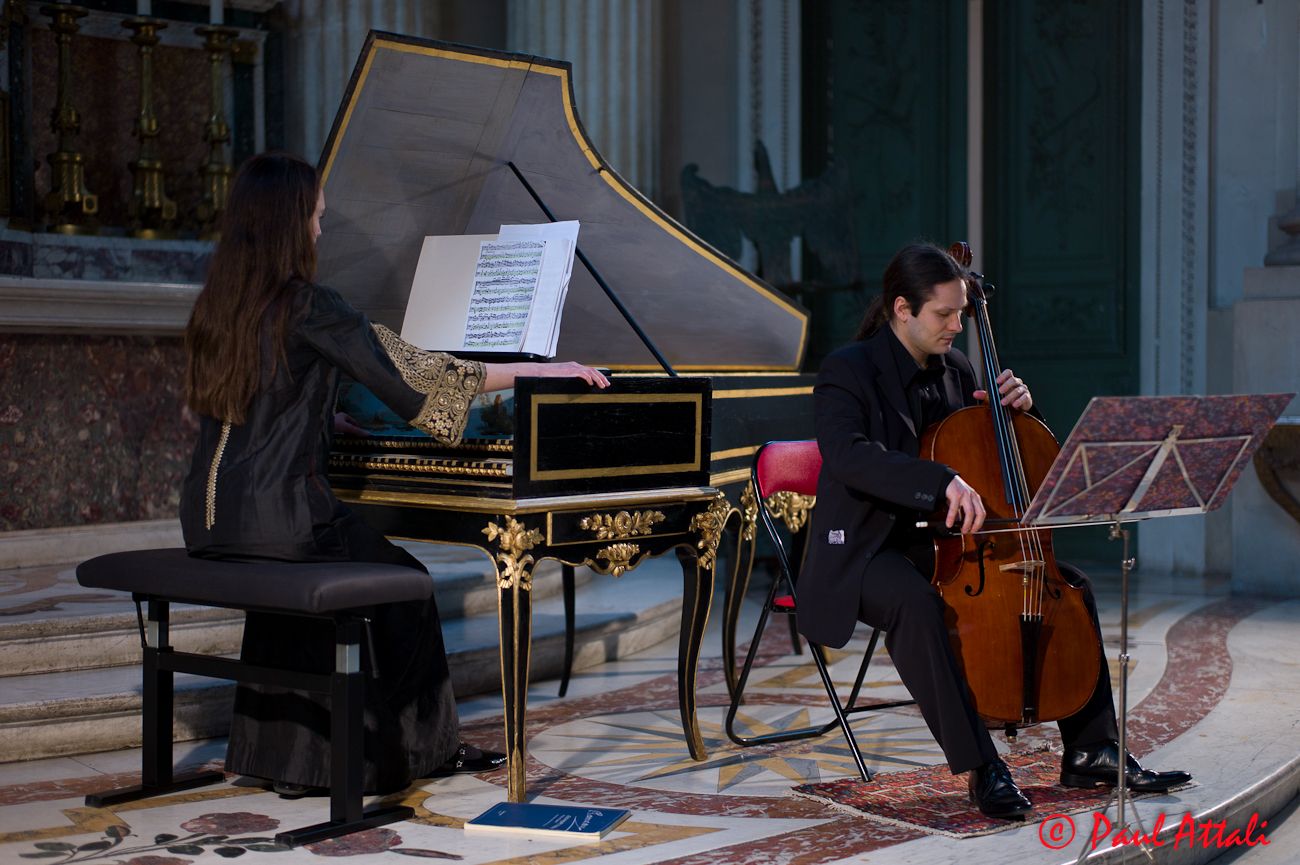
This program demonstrates the sonata for cello and basso continuo spanning chronological as well as geographical distance. The Duo Dialogues proposes a journey from Cattaneo, (who published the ' Tratenimenti Armonici da Camera' in Modena in 1700 from which the first sonata is excerpted) to Jean Barrière, one of the first cello virtuosos in France, born in Bordeaux and active in the 1730's. In between these two extremes, the duo portrays a relationship between composers, genres, and instrumentations with a Sonata by Antonio Vivaldi, JS Bach's transcription of a concerto by Vivaldi for solo keyboard (featuring a Gigue) and excerpts from the first suite for solo cello by JS Bach.
The Duo Dialogues was created in 2006, with the collaboration of two accomplished 'modern' instrumentalists searching to deepen their understanding of interpretation through the study of early music. Studying respectively baroque cello and harpsichord at the time of their meeting, the duo began interpreting Baroque repertoire spanning the works of Frescobaldi to Boccherini. In the years since, they have also devoted themselves to exploring later works for keyboard and cello, using both historical and modern instruments.
Experienced in repertoire spanning a vast period, Alissa Duryee and Jérôme Huille bring a 'panoramic' element to their performances, adapting each program to a particular venue, instrumentation, or theme. Their approach is far from dogmatic; their aim is to use the many tools of performance practice to construct meaningful interpretations. http://www.duodialogues.com/
Alissa Duryee, harpsichord
Jérôme Huille, baroque cello
Totally Telemann!
2017 marks the 250th anniversary of the death of history's most prolific composer, Georg Philipp Telemann. Remarkable among his contemporaries, Telemann not only composed in every genre of his day, but he was also an accomplished player of a range of instruments, including oboe, recorder and harpsichord, all featured in this delightful program of his chamber music.
Fire & Folly is a New York-based ensemble devoted to exciting, moving performances of baroque works on period instruments. Founded in 2010 and co-directed by Rachel Begley and Jeffrey Grossman, the ensemble’s performances have been lauded by critics and audiences alike for their engaging energy and polish in both lesser known works and popular favorites. All instrumental virtuosi in their own right, the members of Fire and Folly are joined by guest artists in showcase programs.
Rachel Begley, recorder
Jeffrey Grossman, harpsichord
with
Sarah Davol, oboe
Sian Ricketts, oboe, soprano
Sarah Stone, cello
Works for Solo Cello
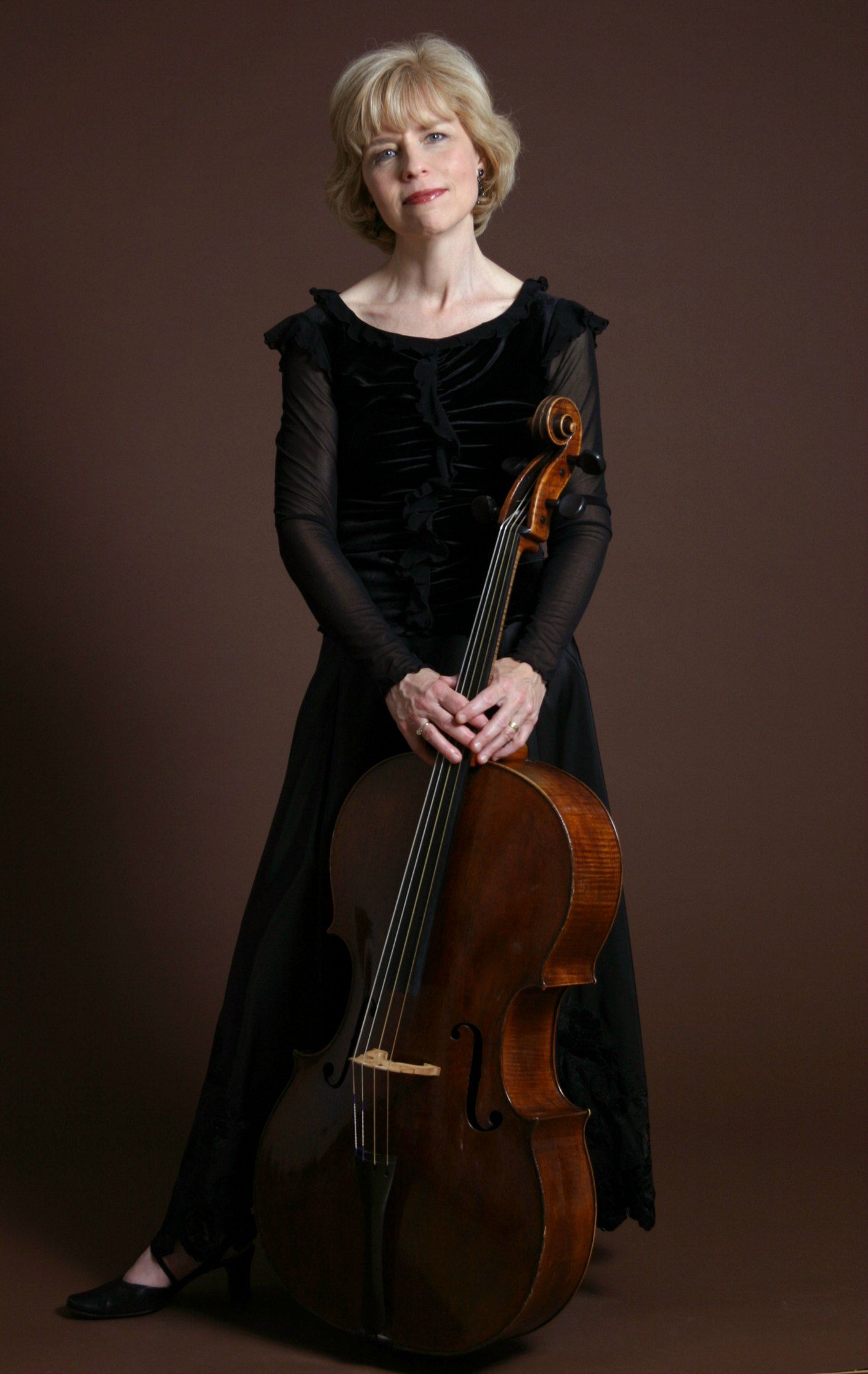
This recital of works of JS. Bach, Guiseppe Maria Dall'Abaco includes Loretta O’Sullivan’s own transcription of the Biber Passacaglia, allowing the audience to experience the resonant, meditative, and intimate quality of solo cello.
Loretta O'Sullivan, cellist with the Four Nations Ensemble, serves as principal cellist with Opera Lafayette and the Bach Choir of Bethlehem. Her work as soloist, chamber player, and continuo cellist can be heard on numerous recordings. As soloist, she's performed the Bach Suites, Ricercari of Gabrielli and Caprices of Dall'Abaco. www.loscello.com
Loretta O’Sullivan, cello
17th Century Baroque Treasures
This concert will offer the chance to hear some of the best-known pieces by some of the most illustrious Italian, German and French composers of the 17th century, including Castello, Frescobaldi, Biber, Lully, and Schmelzer.
Baroque violinist Natalie Kress and harpsichordist Elena Zamolodchikova recently began their collaboration and immediately enjoyed working together on 17th century repertoire, performing to critical acclaim at Zamolodchikova's Final Doctoral recital at Stony Brook University. They are continuing their collaboration and expanding their repertoire and performance appearances.
Natalie Kress, baroque violin
Elena Zamolodchikova, harpsichord
Music from the French Salons
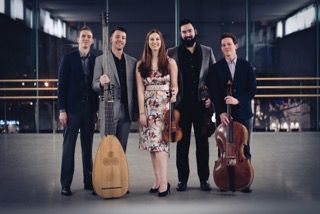
Les Voyageurs will present a varied smorgasbord of French Baroque instrumental music, from the mid-seventeenth through the mid-eighteenth centuries. Well-known composers such as Francois Couperin and Marin Marais are joined by their lesser-known contemporaries for a program that will be sure to delight.
Freshly graduated from the Historical Performance Program at the Juilliard School, the members of Les Voyageurs are excited to continue exploring together the endlessly varied instrumental repertoire of the Baroque.
Jeffrey Girton and Augusta McKay Lodge, violins
Keiran Campbell, cello
Adam Cockerham, theorbo
Robert Warner, harpsichord
The French Baroque Style and the German Court: A Program of Stringed Instruments and Period Dance
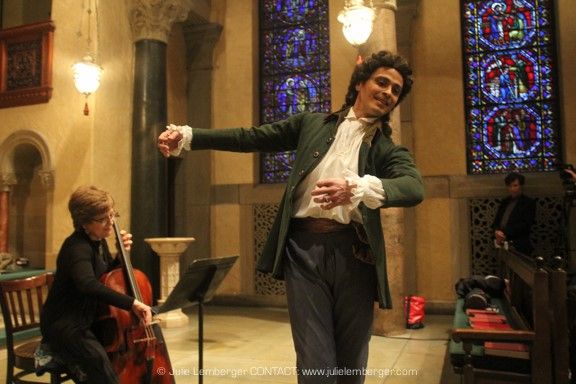
Musical selections by Robert de Visée for Baroque guitar and Ludwig Hesse's arrangement of excerpts from Jean-Philippe Rameau’s opera-ballet La Lyre Enchantée for two viols.
BALAM Dance Theatre (BALAM), inspired by the opulence and theatricality of Balinese theatre, was founded in 1979 by choreographer, educator, and movement analyst Islene Pinder. The company’s eclectic repertoire presented at the grassroots level educates and entertains audiences through a unique blend of traditional and original works representing diverse cultures and time periods, which appeals to all ages and backgrounds. www.balamdancetheatre.blogspot.com
Musicians of BALAM: Lisa Terry and Beverly Au-viols, Adam Cockerham-Baroque guitar
Choreography and dancer: Carlos Fittante
Actor: Inma Heredia
Plot synopsis: Cynthia Ahart Wood, reworked by Carols Fittante and Inma Heredia
La Bella Vita: Hidden Gems of Baroque Italy
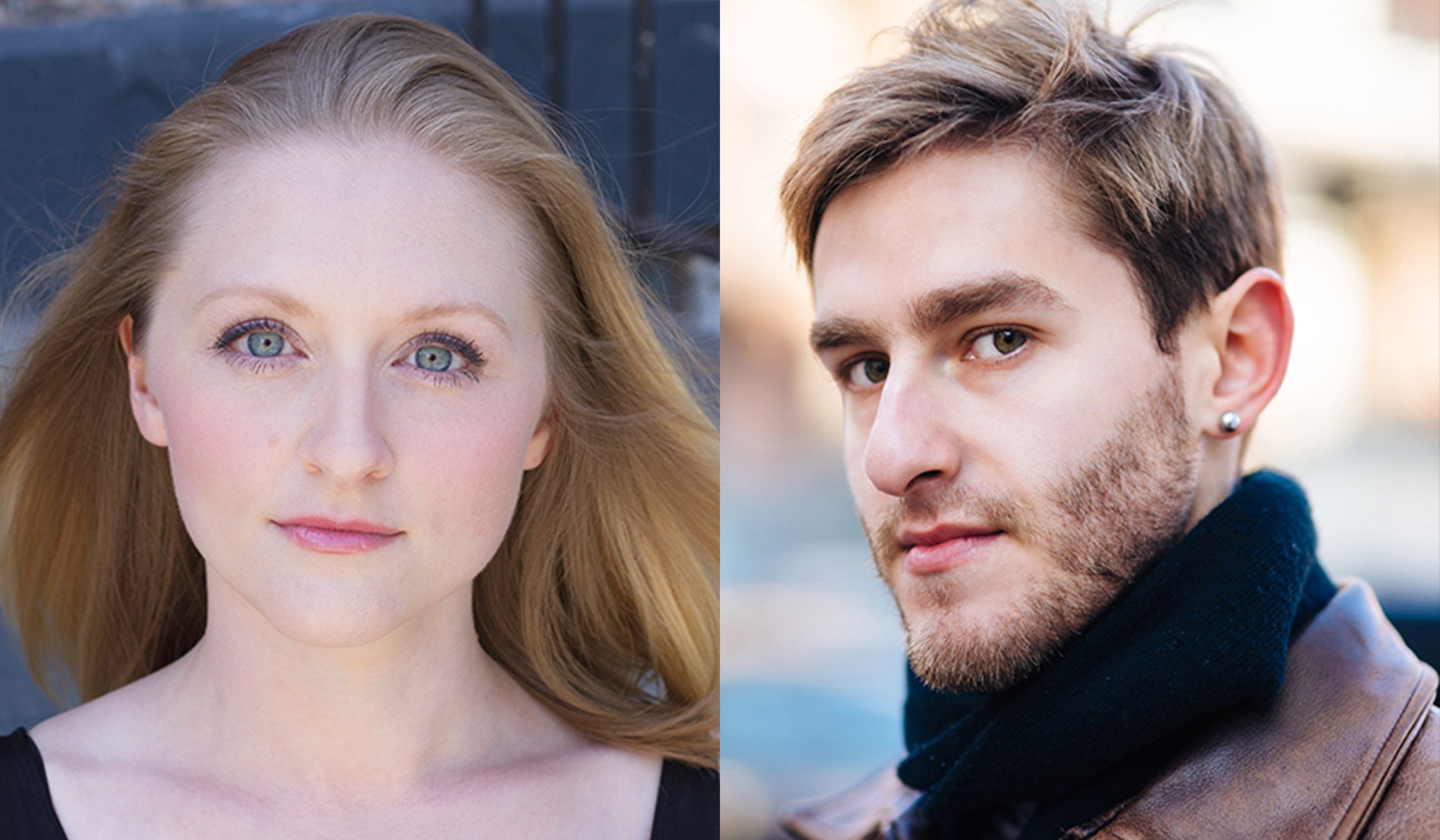
We all want to live la bella vita: the beautiful life. Duo Seraphim explores all aspects of this beautiful life -- loving and losing, laughing and languishing — with this program of rarely-performed Italian Renaissance and Baroque gems, including newly-discovered early 17th-century works making their US premiere.
Featuring soprano Sarah Hawkey and viola da gambist Niccolo Seligmann, Duo Seraphim brings new perspectives to old repertoire, performing rarely-heard music with intimacy and verve, and approaching historical performance with masterful ease and delightful enthusiasm. We are overjoyed to share our second season with GEMS after a well-received debut last season. www.duoseraphim.com
Niccolo Seligmann, Viola da Gamba
Sarah Hawkey, Soprano
Nowell Sing We: A Medieval Celebration
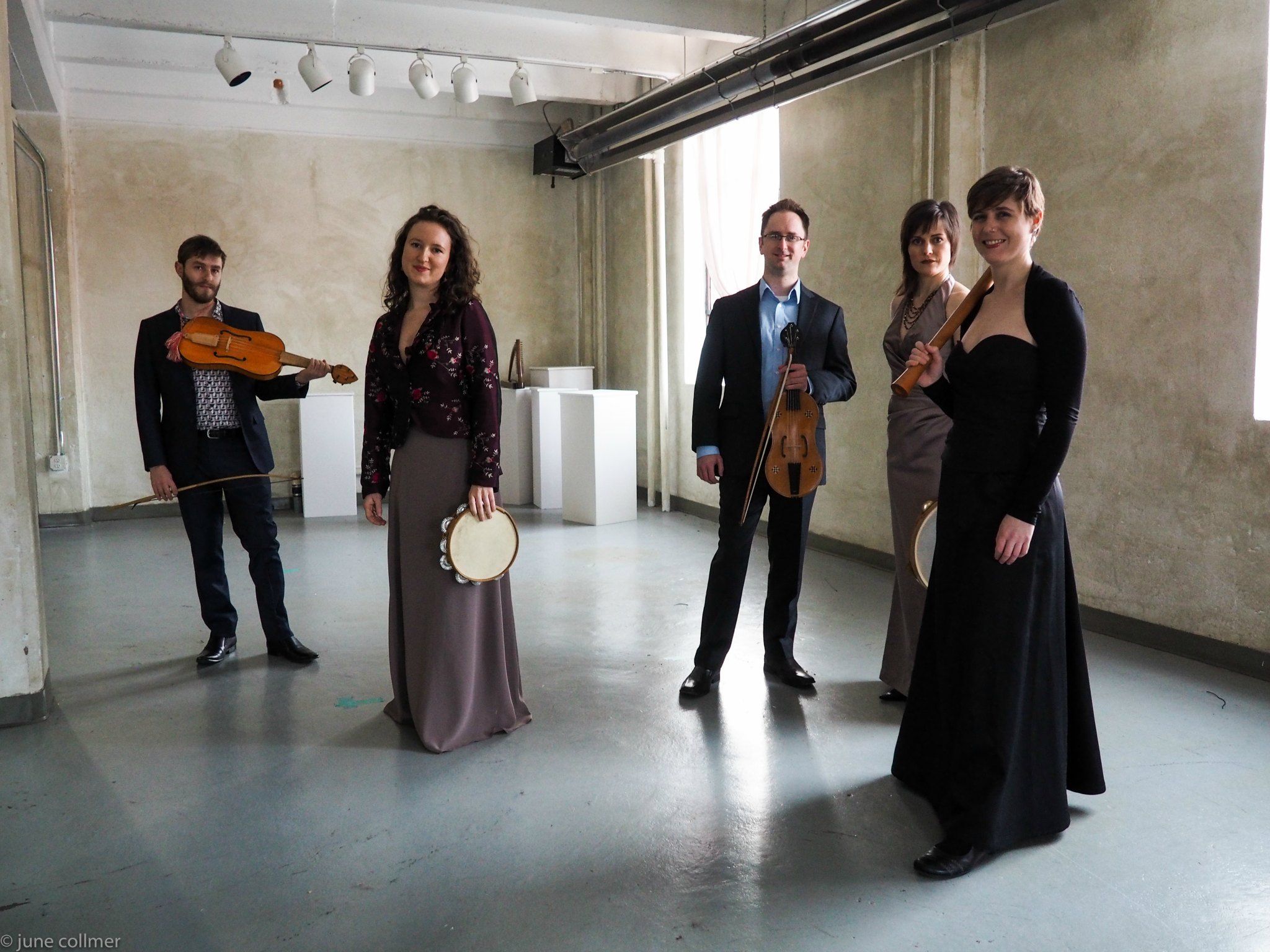
This program takes its inspiration from the celebrations of Twelfth Night and Epiphany, celebrations that have officially marked the end of the Christmas season since the sixth-century Council of Tours. In many Christian traditions, these days observe the culmination of the journey of the three wise men or magi, august personages who traveled to bring gifts to the newborn baby Jesus. This event is customarily celebrated with liturgical services, as well as with the consumption of special foods, beverages, and general merriment, including dances, plays, and music. Our program presents festive and contemplative medieval repertoire from across the Western Christian world that tells the story of the conception, birth, veneration, and celebration of Christ.
Founded by five friends with a zeal for medieval music, Alkemie exists to share the life-affirming and alternative perspectives to be experienced in the sounds of centuries past, especially as they resonate with and challenge our modern-day perceptions. We specialize in medieval music for voices and instruments, with a particular interest in the porous boundaries of this period – traversed repeatedly from clerics penning bawdy Latin poems in manuscript margins to courtly lovers evoking the mystical sublime. www.alkemie.org.
Tracy Cowart, voice, percussion, bray harp
David McCormick, vielle
Elena Mullins, voice, percussion
Sian Ricketts, voice, recorders
Niccolo Seligmann, vielle, percussion
Time, Cruell Time!
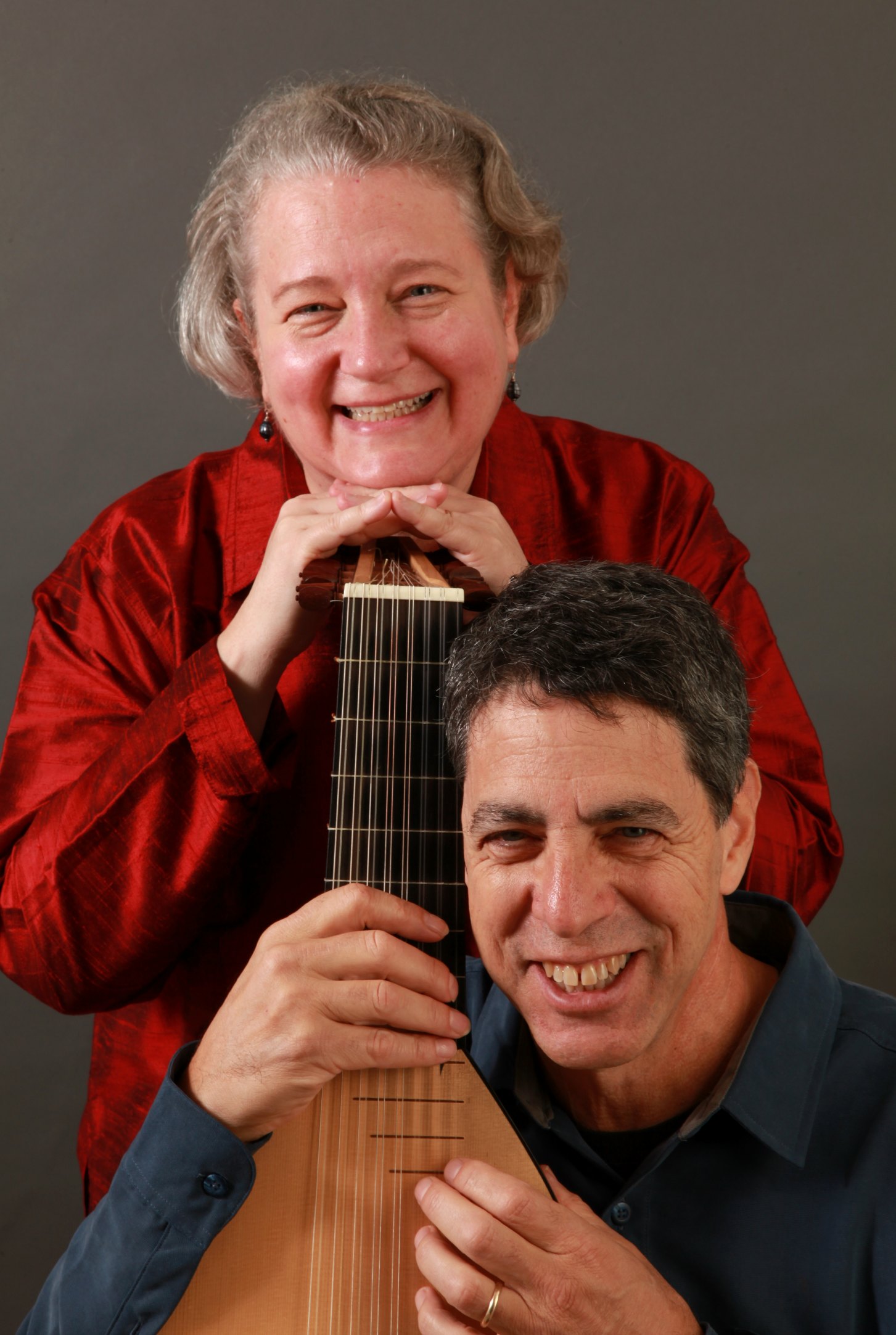
Described as singing with "an artful simplicity that illuminated the text and beguiled the ear,” mezzo-soprano Barbara Hollinshead studied with Max van Egmond in the Netherlands. She has sung with many of the finest early music groups in eastern North America, including over 20 years of performances with ARTEK. She teaches voice at American University, leads vocal technique workshops for choirs, and acts in the Washington Bach Consort’s school presentations for DC-area third graders.
Howard Bass is a lutenist and guitarist who performs regularly with Barbara Hollinshead and Sephardic singer-composer Flory Jagoda. A member of Trio Sefardi, he has also performed and recorded with Hesperus, the Smithsonian Chamber Players, the Folger Consort, and the Baltimore Consort among others. From 1981 to 2011 he was a program producer at the Smithsonian’s National Museum of American History and the National Museum of the American Indian. www.hollinsheadbass.com, www.triosefardi.com
Barbara Hollinshead, voice (mezzo-soprano)
Howard Bass, lutes
Treasure Laden
 This season, the New York Philharmonic has invited ALBA Consort to participate in its “New World Initiative” and explore interpretations of Antonin Dvorak’s Symphony no. 9, “From the New World”. In “Treasure Laden”, ALBA Consort weaves iconic themes from the New World Symphony with early Sephardic, Iberian, French, Italian, Cypriot, Armenian, and North African music - bridging the Ancient and Brave New World.
This season, the New York Philharmonic has invited ALBA Consort to participate in its “New World Initiative” and explore interpretations of Antonin Dvorak’s Symphony no. 9, “From the New World”. In “Treasure Laden”, ALBA Consort weaves iconic themes from the New World Symphony with early Sephardic, Iberian, French, Italian, Cypriot, Armenian, and North African music - bridging the Ancient and Brave New World.
Bringing new life to ancient music, ALBA Consort specializes in Mediterranean and European early music on traditional instruments. Songs and ballads, instrumentals and dances - ALBA Consort explores secular Medieval, Renaissance, and Early Baroque music. Beautiful melodies, poetry and improvisation are a major part of this musical tradition. ALBA's mission is to illuminate the spirit of this unique repertoire with exciting performances to our modern audience. The word “ALBA” means white, the white light of dawn, and an ALBA is the troubadour genre of a morning song - often a song of a lover as dawn approaches. ALBA has performed at NY’s Greene Space for GEMS Live! (also podcast on WQXR radio), Bargemusic, University of Chicago Presents, Long Island Baroque, “Early Music Now” in Milwaukee, “Academy of Ancient Music” in Michigan, Music at St. Albans, featured on a CUNY.TV Classic Artist Showcase series and for Chamber Music America’s annual conference. ALBA Consort is a member of Chamber Music America and Early Music America.
ALBA Consort is honored to partake in the New York Philharmonic’s New World Initiative for their 175th year anniversary.
http://www.albaconsort.com
Margo Andrea: Mezzo Soprano, Vielle
Christopher Morrongiello: Lute, Baroque Guitar
Carlo Valte: Oud
Rex Benincasa: Percussion, Psaltery, Voice
Telemann and Bach
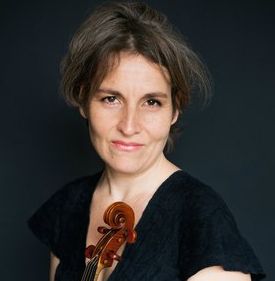
From Telemann’s touching and introspective Fantasie to the expansive Sonata in C major by Bach, this program explores the range and expressive depth that instrumental music in the first decades of the 18th century had reached.
Theresa Salomon received her musical education in her native Germany, the Netherlands and in Austria. Since 1991 she has been a member of the Goldberg Ensemble of Vienna and has toured with the string quartet of the Ensemble in Austria, Germany, France and Italy. She was awarded the Lion's Club "Forderung junger Kunstler" Award and played in the Lion's Club Young Artists Concerts in Weisbaden, Germany. She has performed as a soloist with the Jupiter Symphony, the Metamorphoses Orchestra in New York, the Orchestra of the Chambermusic Society in Vienna and the Wiesbaden Orchestra in Germany.
Ms. Salomon has appeared in many European festivals including the Gulbenkian Festival in Portugal, the Festival Presence in Paris, the Prague Spring Festival and the Takemitsu Memorial Festival. As a performer of contemporary chamber music she has worked with many ensembles including the STX Ensemble Xenakis in the USA, the SEM Ensemble and the Orchestra of SEM Ensemble. She has recorded for Vandenburg and Tzadik Labels.
Theresa Salomon, violin
The Truly French Horn
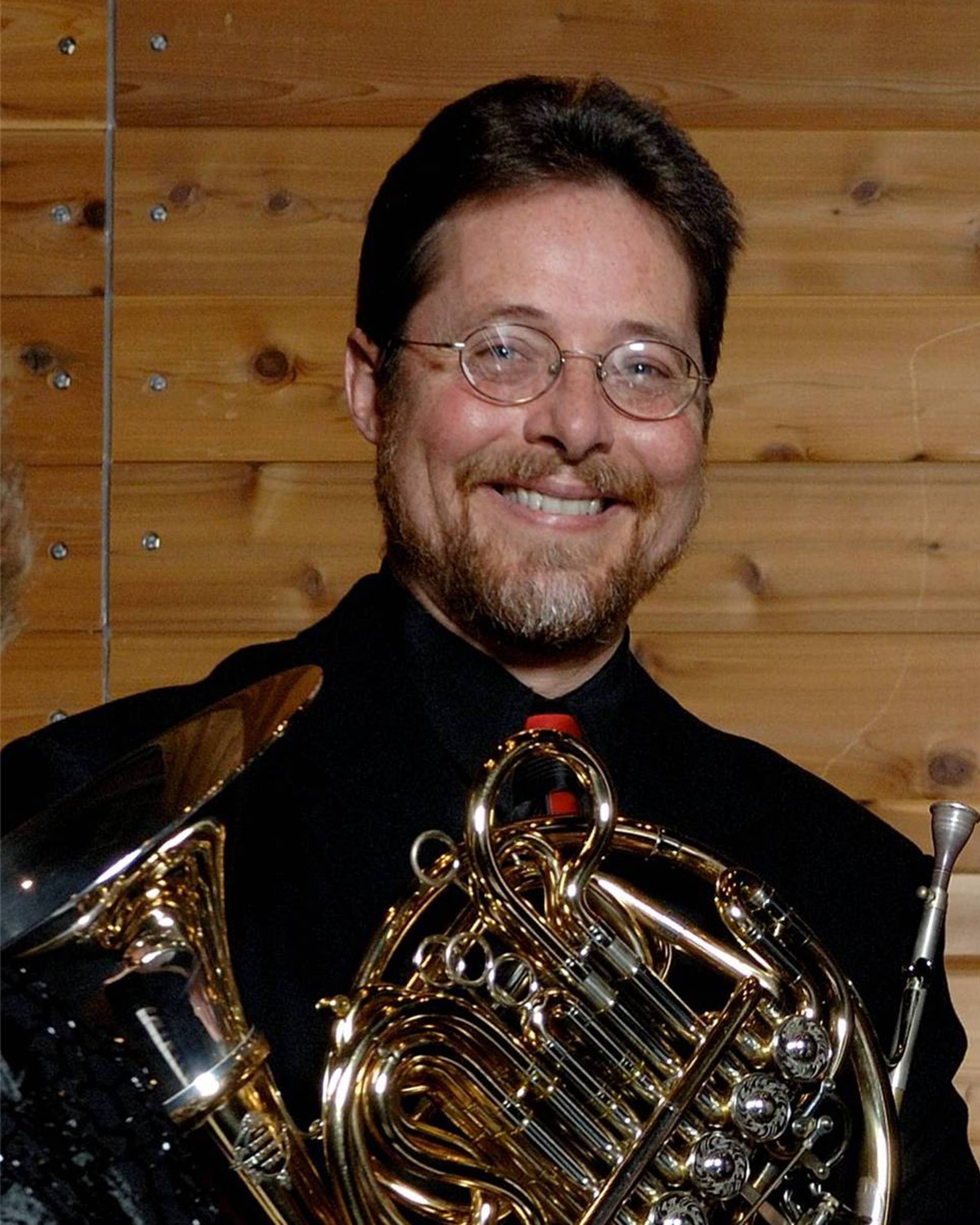 The French aesthetic of horn playing hewed to the lyricism and delicacy of the natural horn even after the adoption of valves. This aesthetic was preserved in the design and dimensions of the horns in use. The "internationalization" of the 1970's ushered in changes in repertoire that made the softly-voiced French piston-valve horn obsolete. A natural horn specialist, Doug stumbled into the opportunity to purchase the Selmer horn that belonged to the great soloist Lucien Thevet for whom Tomasi wrote his concerto. Douglas Lundeen will be performing on that instrument at the concert.
The French aesthetic of horn playing hewed to the lyricism and delicacy of the natural horn even after the adoption of valves. This aesthetic was preserved in the design and dimensions of the horns in use. The "internationalization" of the 1970's ushered in changes in repertoire that made the softly-voiced French piston-valve horn obsolete. A natural horn specialist, Doug stumbled into the opportunity to purchase the Selmer horn that belonged to the great soloist Lucien Thevet for whom Tomasi wrote his concerto. Douglas Lundeen will be performing on that instrument at the concert.
Douglas Lundeen originally trained as an opera singer with Frank Baselice of the Metropolitan Opera. Largely self-taught on the French horn, he won first prize for solo natural horn in the 1987 American Horn Competition. Since then, Dr. Lundeen has played principal horn with period instrument orchestras in New York City, Boston, Chicago, San Francisco, Philadelphia, Vancouver and Washington, D. C, under such conductors as Hogwood, Norrington, Brüggen, Parrott, and Koopman, and has been a featured recitalist and master clinician at many conferences of the International Horn Society and the International Early Brass Society. On the modern horn, he has soloed and played principal horn with orchestras in Costa Rica, Cincinnati, Philadelphia and Pittsburgh as well as on Broadway. Dr. Lundeen is currently Principal Horn of the Princeton Symphony and Assoc. Prof. of Music at Rutgers University. He has recordings on the Sony, Newport Classics, Musical Heritage Society, and Centaur labels.
Douglas Lundeen, Selmer Piston Horn
Barbara Gonzalez Palmer, Piano
Love and War
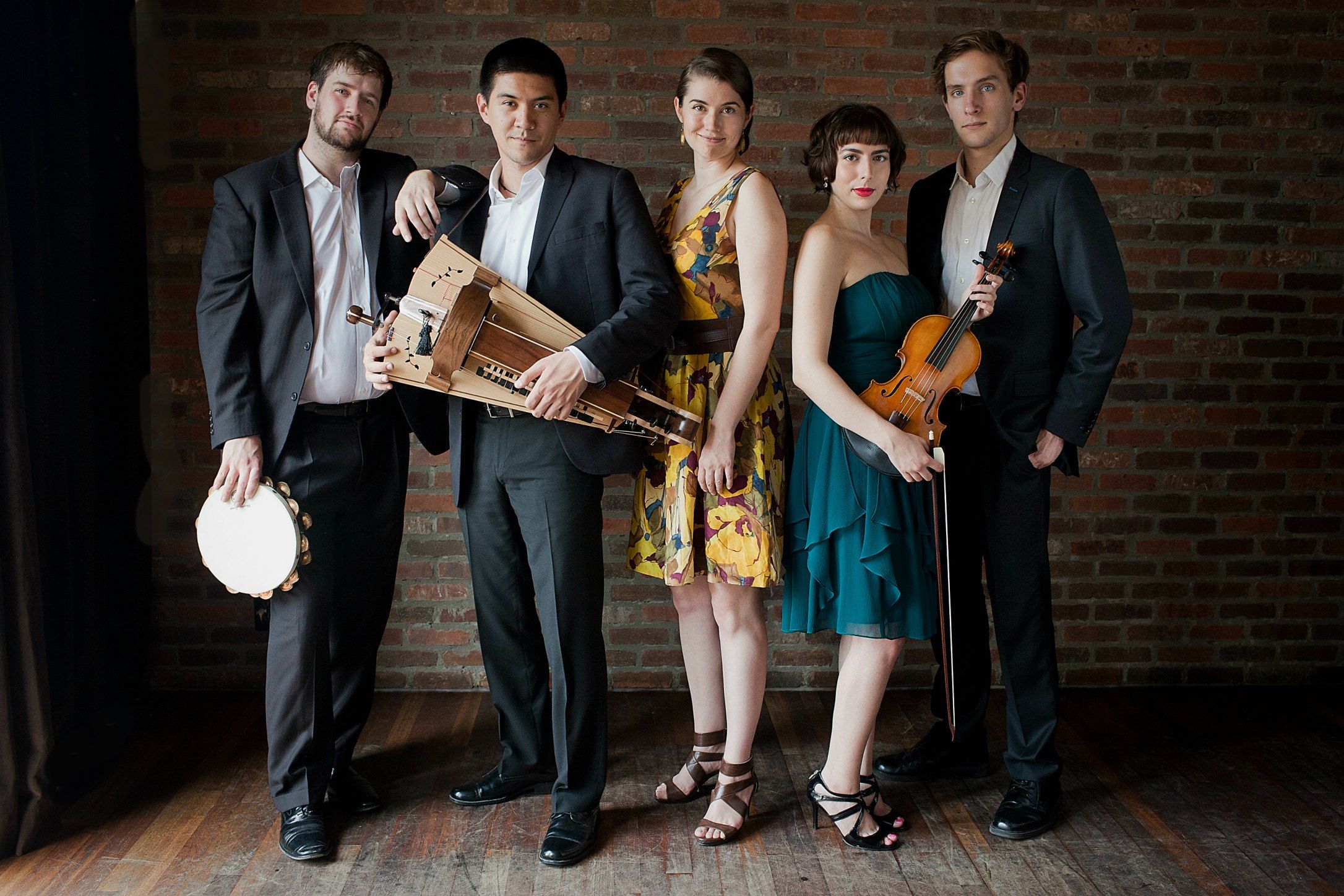 Love has always been a battlefield, even many centuries ago, and in their third season, les soûls d'amour explore the many ways that the trials of war and the travails of love intersect and collide. Featuring tales of tragedy, triumph, loss, and death--as well as several songs of war.
Love has always been a battlefield, even many centuries ago, and in their third season, les soûls d'amour explore the many ways that the trials of war and the travails of love intersect and collide. Featuring tales of tragedy, triumph, loss, and death--as well as several songs of war.
Telling stories from the Renaissance and Baroque as you’ve never heard them before, les soûls d’amour are equally comfortable in the church, the concert hall, and the coffeeshop. With innovative arrangements and unique instrumentation, these soûls sing tales of love, loss, and the joys of a good drink with friends. www.facebook.com/lessoulsdamour
Madeline Healey, soprano
Molly Netter, soprano
Andrew Padgett, baritone and hurdy-gurdy
Alana Youssefian, violin
David Ellis, viola da gamba
Jake Street, harpsichord and artistic direction
